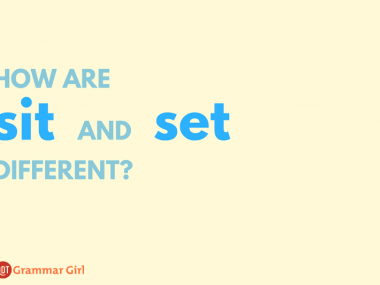Make Me a Sandwich: A Joke About Verbs
When Nora says, “Make me a sandwich,” Bert responds, “Poof! You’re a sandwich!” It’s a funny joke (sometimes), but does Bert have a point about the grammar and meaning of the sentence? Neal Whitman explains.
A listener named Nora has a question about a grammar joke that never gets old. Or does it? (I’ve changed the names to protect the innocent.) She writes:
My husband, Bert, … is a big fan of yours. When someone asks Bert to make something for them, like a sandwich, if you phrase the question as, “Bert, will … you make me a sandwich?” he responds, “Okay…Poof! You’re a sandwich!” while waving his hands like he is performing a magic trick. This response is both funny and offensive. Sometimes I find it hilarious and other times it makes me feel like I am stupid. Basically, I’ve banned him from making this joke to me anymore.
He thinks that the proper way to phrase this question would be, “Bert, will you make a sandwich for me?” I contend that both are fine but I’d love to hear your opinion.
My brother and I used to make the same joke with our little sister. When she’d say, “No! A real peanut butter sandwich!” we’d say, “Oh, well, why didn’t you say so! You’re a real peanut butter sandwich!”
I love this joke because it forces you to think about how the meanings of larger phrases are composed from the meanings of smaller phrases and individual words.
Transitive Verbs and Intransitive Verbs
If you’ve listened to this podcast for a while, you’ve probably heard about transitive and intransitive verbs. If you haven’t, here’s a quick review. Transitive verbs are verbs that have to have both a subject that performs the action, and a direct object, which undergoes the action. For example, in the sentence Fenster ripped his pants, the subject is Fenster, and the direct object is his pants.
Intransitive verbs require only a subject. For example, the sentence Rover barked has the subject Rover, but no direct object. Many verbs can be either transitive or intransitive. For example, eat is intransitive in Aardvark is eating, but it’s transitive in Aardvark is eating Squiggly’s chocolate.
Ditransitive Verbs and Resultative Verbs
The “make me a sandwich” joke throws the spotlight on a third class of verbs, called ditransitives. They take not only a direct object that undergoes the action, but a so-called indirect object, which always comes before the direct object, and usually refers to someone who benefits from the action.
In make me a sandwich, assuming we’re interpreting it in the non-jokey way, the pronoun me is the indirect object: It refers to the person who benefits from the action, by receiving the sandwich. The noun phrase a sandwich is the direct object: It’s the thing that gets made. For a sampling of other ditransitive verbs, you can give people a break, send them a card, get them some help, show them the love, do them a favor, shoot them an e-mail, or tell them a joke.
The thing that makes the “Poof! You’re a sandwich!” joke possible is the existence of yet another class of verbs, known as a resultatives. This kind of verb takes a direct object, plus a word or phrase that describes how the direct object ends up. For example, turn is a resultative verb in the sentence The industrial runoff turned the creek orange. The direct object is the creek, and orange is an adjective telling us how the creek looked afterward. For some other examples of resultative verbs, you can slap people silly, drive them crazy, or leave them cold. Make is a resultative verb too; you can make people angry, make them happy, or make them proud or ashamed.
Noun Phrases as Adjectives
All our resultative examples so far have used adjectives to show how the direct object ended up: orange, silly, crazy, cold, angry, happy, proud, and ashamed. But a few resultative verbs allow you to use noun phrases as well as adjectives. For example, you can elect someone president, or name your pet iguana Jubjub. Make can do this, too, in sentences such as You’ve made me the happiest man in the world or That makes you an accomplice.
The name for this adjective or noun phrase after the direct object of a resultative verb is the object complement. The general term for subjects, direct objects, indirect objects, object complements and other parts of a sentence is grammatical functions.
Me as a Direct Object or Indirect Object
The funny meaning of Make me a sandwich corresponds to a second way of assigning grammatical functions to the pronoun me and the noun phrase a sandwich. While the non-funny meaning has me as an indirect object, and a sandwich as a direct object. The funny meaning has me as the direct object, and a sandwich as the object complement.
According to Nora, her husband Bert considers the funny meaning, with make as a resultative verb, to be the only grammatical one. If this is true, either Bert doesn’t believe in ditransitive verbs at all, or he doesn’t think mean can be both a ditransitive verb and a resultative verb. Most likely, though, he just can’t resist a classic grammar joke setup when it comes along.
In the “Make me a sandwich” joke, the funny meaning has make as a resultative verb, and the serious one has it as a ditransitive, but there are other jokes involving make, in which the funny and serious meanings go the other way. One is in the cult-classic movie The Rocky Horror Picture Show. In one scene, the mad scientist Dr. Frank-N-Furter sings, “In just seven days, I can make you a man!” On the surface, he’s using make as a resultative verb, and talking about turning a 98-pound weakling into a strong, muscular man. However, as he sings the song, he is presenting to his audience the latest creation from his laboratory—a man that he has actually created. So the audience is drawn to think of make as a ditransitive verb, with the noun phrase a man as the direct object, the thing that gets made.
Of course, Bert is correct that you can avoid the ambiguity of Make me a sandwich by saying Make a sandwich for me. By using me as the object of the preposition for, instead of as an indirect object, you kill the “Poof! You’re a sandwich!” punchline before it’s even a possibility. Even so, Make me a sandwich is shorter than Make a sandwich for me, and is just as grammatical as other sentences with ditransitive verbs, such as Fix me a sandwich. Moreover, there will always be sentences with multiple meanings, in whatever language you speak, and it doesn’t make sense to declare that only one of those meanings is grammatical when that happens. In fact, Make a sandwich for me is ambiguous, too. Does it mean “Make a sandwich for me to eat,” or does it mean “I’m too busy to make a sandwich to pack in our child’s lunch right now, so could you do it for me?”
Furthermore, which misunderstanding is more likely? Someone making your favorite sandwich when you wanted them to make your son’s or daughter’s favorite sandwich, or someone making your favorite sandwich when what you really wanted was for them to turn you into a sandwich? Personally speaking, that’s only happened to me once or twice.
That was written by Neal Whitman who has a PhD in linguistics, blogs at literalminded.wordpress.com, and is a regular contributor to the online resource Visual Thesaurus.
Image courtesy of Shutterstock.





